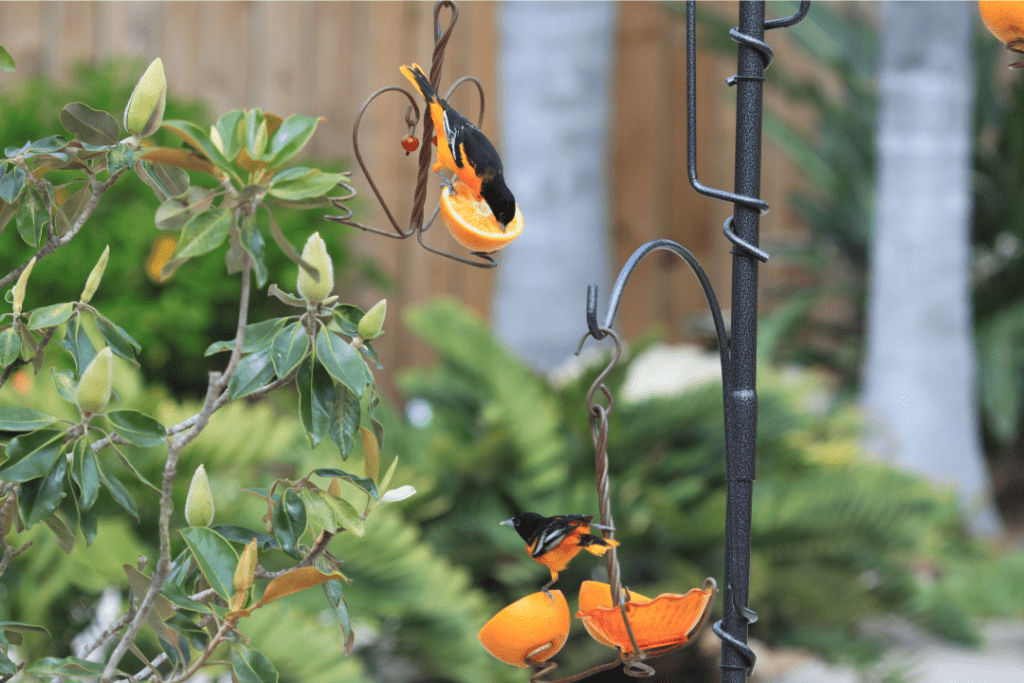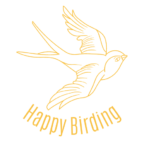When providing snacks for backyard birds, variety is key. There are lots of species that may or may not choose to stop by your feeding area, and they have a range of preferences. The more food types you offer, the more species you’ll attract.
Sparrows and cardinals love millet. Pigeons and doves are fond of cracked corn. Meanwhile, most birds are happy to munch on sunflower seeds, and all birds need water.
Robins, orioles, thrushes, tanagers, and many other songbirds enjoy snacking on fruit.
If you choose to serve up some fresh fruit, oranges are a healthy and desirable treat for some backyard birds.

Can Birds Eat Oranges? Are Oranges Even Safe and Healthy For Birds?
The bright, sweet oranges we know and love are a human-made hybrid that originated in East Asia. So, modern oranges aren’t a natural part of any avian diet, especially in North America. However, most of the birds that visit our backyards are opportunistic omnivores that can safely consume most fruits.
Oranges and other citrus fruits are appealing, tasty, and reasonably healthy.
Health Benefits and Risks for Birds That Eat Oranges
Oranges provide vitamins and minerals, carbohydrates, sugars, and fiber.
For humans, oranges are known as a strong source of vitamin C.
Like humans, birds need vitamins, including C. However, unlike humans, many plants and animals, including birds, are able to produce their own vitamin C.
Most birds make their own vitamin C in their livers and therefore don’t have a major dietary need for it.
Too much vitamin C may cause a bird to increase gut absorption of iron and other minerals. This can result in liver damage. Therefore, pet birds should be fed oranges and other C-heavy foods in moderation or with guidance from a vet.
When feeding wild birds, oranges are best used as part of a mix of foods that includes some more protein-rich items. Birds that overdo it on oranges could end up suffering from intestinal problems. However, you’re unlikely to cause harm by providing a few oranges as an occasional treat.
Do Birds Like to Eat Oranges and Other Fruits?
Plenty of songbirds favor fruit. These include robins, bluebirds, and mockingbirds.
Orioles and tanagers are known to enjoy oranges, in particular.
Other fruits that are healthy and appealing for backyard birds include:
- Watermelon
- Raisins
- Grapes
- Blueberries
- Raspberries
- Sliced apples
Most bird species can’t taste sweetness. The tangy pulp of an orange or the juicy flavor burst of a blueberry would do absolutely nothing for a hawk or a vulture.
However, hummingbirds and songbirds are believed to detect and enjoy sweet flavors.
Additionally, the bright colors of fruit skins are eye-catching for songbirds.
Compared to humans, birds have a superior ability to see colors. They’re often attracted to bright colors—both in their mates’ plumage and in their food choices. Colorful fruits are a great way to convince new birds to visit your backyard.
Birds Eating Oranges!
How to Safely Provide Oranges for Birds
Don’t expect birds to hack open a full orange. Instead, cut oranges into slices before adding them to your feeding area.
You can simply set orange slices on a platform feeder. Or, stick entire orange halves on a skewer or press them onto a nail (peeled side facing out) that sticks out of your deck or a tree.
Don’t worry about removing an orange’s seeds. Birds will either peck around the seeds or they’ll safely eat them.
While citrus seeds are safe, not all fruit seeds are. Some seeds contain cyanide and other harmful toxins. Larger seeds and pits, like peach pits, tend to be more hazardous.
Before providing fruits and other seeded foods to birds, check these lists:
Seeds That Are Safe for Birds | Seeds and Pits That Are NOT Safe for Birds |
Orange, lemon, grapefruit, grape, cranberry, watermelon, pomegranate, cantaloupe, squashes, pumpkin | Apple, cherry, peach, apricot, plum, pear, nectarine |
While some fruit seeds are unsafe for birds, many non-fruit seeds (along with the fruit seeds listed above) are excellent bird foods. These include sunflower seeds, nyjer seeds, and flax seeds.
Other Healthy Foods for Backyard Birds
Fruits are fun and colorful treats that you can safely share with your local birds.
Aside from fruits, here are a few of the very best foods you should add to your bird-feeding area:
- Millet
- Sunflower seeds
- Unsalted peanuts
To really do your feathered friends a favor, provide water. A bird bath is a simple one-time purchase that turns your backyard into a safe, restorative, watering area. An elevated bird bath allows for peaceful sips of water at a height that (mostly) protects birds from ground-level predators.
For more birdwatching guides, including lots of backyard feeding topics, visit the Happy Birding Blog.

Kelly is an environmental science writer, naturalist, and birdwatcher. Kelly holds a master’s degree in environmental policy and has worked as an environmental analyst, urban planner, and professor of environmental planning.
